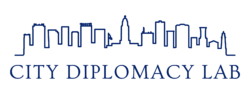Innovating Urban Resilience
Financing Strategies and Smart Solutions for Cities Worldwide
📍12th World Urban Forum, Cairo, Egypt – Multipurpose room 03
🗓 November 5, 2024, at 5:00 pm local time (UTC+2)
Urban resilience requires innovative strategies that blend institutional creativity, local engagement, and global expertise. At the 12th World Urban Forum in Cairo, the City Diplomacy Lab, the five United Nations Regional Commissions (UNECE, UNECLAC, UNECA, UNESCWA, and UNESCAP), and UN-Habitat gathered experts and city leaders to explore some of the most innovative approaches to overcoming urban challenges such as climate change, socio-economic crises, and rapid urbanization.
This hybrid networking event was organized within the framework of the United Nations Global Development Account (UNDA) project entitled Supporting Member States in Urban Economic Resilience, whose goal is to strengthen the capacity of cities to mitigate, recover, adapt, and transform toward sustainability in the face of a wide array of shocks and stresses.
Watch the Recording
Summary
Dr. Lorenzo Kihlgren Grandi, founding director of the City Diplomacy Lab, set the stage by emphasizing resilience as a collaborative ecosystem. He framed cities as living organisms thriving through the dynamic interplay of actors and partnerships, which are essential for crafting adaptive solutions to modern crises.
Representing the United Nations, Ms. Fiona Littlejohn-Carrillo, Economic Affairs Officer at the UNECLAC, introduced the United Nations Global Development Account (UNDA) project entitled Supporting Member States in Urban Economic Resilience. This inter-agency pilot project is designed to equip cities worldwide with tools to fund and implement urban economic resilience strategies. Her contribution underscored the necessity of tailoring these efforts to specific local contexts, ensuring no city is left behind.
From the European Bank for Reconstruction and Development, Mr. Emre Oguzoncul showcased the Green Cities program as a flagship initiative. His key insight was the importance of innovative financial instruments, such as green bonds, which empower cities to prioritize and fund their unique climate action plans.
Mr. Ko Takeuchi of the World Bank underscored the importance of proactive urban planning. He emphasized leveraging robust data and global trust funds to design scalable projects that incorporate both short-term adaptation needs and long-term climate mitigation goals.
Drawing from her expertise in urban economics, Prof. Cynthia Goytia of the Torcuato di Tella University in Buenos Aires advocated for integrating risk management into urban planning. She presented compelling examples of how cities can recoup the costs of resilience projects by capturing the value these investments generate, such as through land-based financing.
Dr. Viswanathan Srinivasan, from Tamil Nadu’s Green Climate Company, highlighted an ambitious initiative to implement energy-efficient projects, urban forestry, and lake restoration. He stressed the importance of forging partnerships with international organizations to strengthen local capacity and attract funding.
Advocating for smart technologies, Dr. Maysoun Ibrahim described how tools like AI and digital systems have revolutionized urban resilience, particularly during crises like COVID-19. Her message centered on the transformative potential of technology, paired with citizen engagement, to adapt urban systems rapidly.
From Amman, Eng. Ahmad Malkawi discussed the city’s innovative flood mitigation project and its updated zoning laws. His contribution emphasized Amman’s efforts to incorporate community voices into neighborhood-level urban planning, fostering a shared sense of responsibility.
Hon. Jacob Mafume, the Mayor of Harare, highlighted financial resilience as a cornerstone of urban stability. His plans to create a city stabilization fund and improve revenue collection reflected the necessity of sustainable financing mechanisms in resource-constrained environments.
From Santa Fe, Ms. Lucila García detailed an inspiring urban reserve project that transformed flood-prone wetlands into a resilient public space. Her example demonstrated how cities can blend environmental restoration with social benefits, such as housing relocations for vulnerable populations.
Finally, Ms. Sonja Dragović, a researcher at KANA/ko ako ne arhitekt in Podgorica, emphasized the power of grassroots urban resilience. She advocated for policymakers to recognize and integrate community-driven initiatives, such as sustainable mobility projects, which often provide the groundwork for long-term urban sustainability.
Ms. Anna Katrina Karaan, representing UN-Habitat’s City Resilience Global Program, closed the event by emphasizing the need to turn plans into actionable realities. She highlighted the program’s ongoing efforts to support cities in developing financing strategies and announced a free, self-paced e-learning course aimed at sharing knowledge on urban economic resilience. This course integrates lessons learned from collaborative projects and the event itself, encouraging participants to join the global journey toward building resilient, sustainable urban futures.
Program
Opening remarks
- Dr. Lorenzo Kihlgren Grandi, Founding Director, City Diplomacy Lab
- Ms. Fiona Littlejohn, Economic Affairs Officer, Human Settlements Unit, UNECLAC
Panel of Experts
- Mr. Emre Oguzoncul, Principal, Climate Strategy & Delivery, European Bank for Reconstruction and Development (EBRD)
- Mr. Ko Takeuchi, Senior Specialist on Urban Development and Disaster Risk Management, World Bank
- Prof. Cynthia Goytia, Professor of Urban Economics, University Torcuato di Tella, Argentina
- Dr. Viswanathan Srinivasan, Chief Executive Officer, Tamil Nadu Green Climate Company, Department of Environment, Climate Change and Forest, Government of Tamil Nadu
- Dr. Maysoun Ibrahim, Founding President, Palestinian Syndicate for Information Sciences and Technology (Online)
UNDA16 Cities Testimonies
- Eng. Ahmad Malkawi, City Manager, Amman, Jordan
- Hon. Jacob Mafume, Mayor of Harare, Zimbabwe
- Ms. Lucila García, Director, Agency for Cooperation, Investment and Foreign Trade (ACICE), City of Santa Fe, Argentina (Online)
- Ms. Sonja Dragović, Researcher in urbanism and public policy, KANA/ko ako ne arhitekt, Podgorica, Montenegro
Closing Remarks
- Ms. Anna Katrina Karaan, Urban Resilience Specialist, City Resilience Global Programme (CRGP), UN-Habitat




